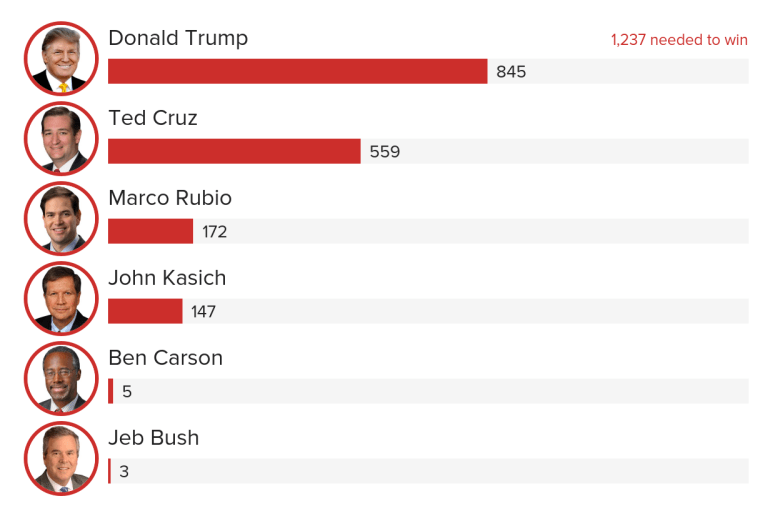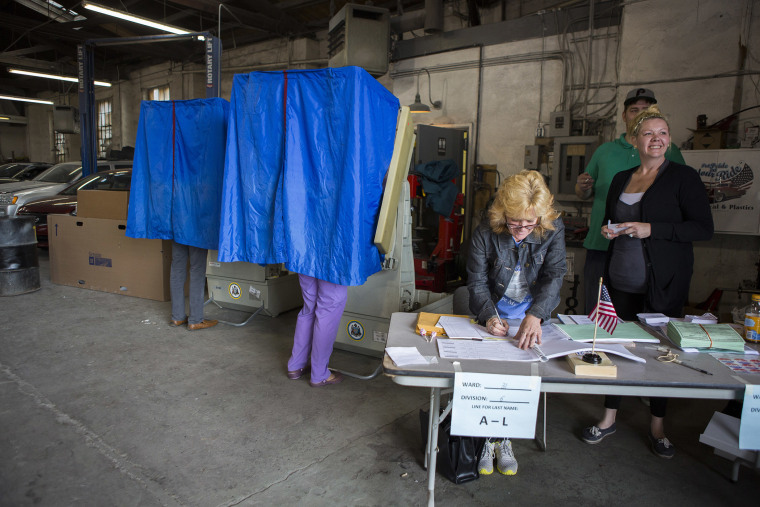First Read is a morning briefing from Meet the Press and the NBC Political Unit on the day's most important political stories and why they matter.
Tonight begins make-or-break week in GOP race
It's very possible that the next seven days will be the most crucial week in determining whether Donald Trump can reach the 1,237 delegates he needs to win the Republican presidential nomination on a first ballot -- and if he can knock out his opposition. That stretch begins tonight with the five East Coast primary contests in Connecticut, Delaware, Maryland, Pennsylvania, and Rhode Island. Here is Trump's path:
- He needs to win 90 to 95 of the 118 pledged delegates that are up for grabs in tonight's five states;
- He needs about two-thirds of the 54 unbound delegates being elected in Pennsylvania to either be Trump supporters or folks who will support whoever wins their congressional district (i.e., Trump);
- And he needs to beat Cruz in Indiana, even if they split the delegate haul.
If Trump accomplishes all three, his path to 1,237 will be clear. And more importantly, his opposition -- Ted Cruz, John Kasich, the "Stop Trump" movement -- will collapse. If Cruz loses in Indiana, it's over for him; it's that simple. But if Trump falls short on either of those three goals, then his opposition has a rationale to keep fighting, and his path to 1,237 is more perilous.
The Cruz-Kasich alliance: Too little, too late?
Want another example of how complicated -- and confusing -- the Cruz-Kasich alliance/truce is? When NBC's Matt Lauer on "Today" asked Kasich what message he had to Indiana voters for whom they should vote, the Ohio governor responded, "I'm not getting into that." Oof. Here's the reality: This alliance/truce was a good idea six weeks ago. Now it seems too little, too late -- and very desperate. Think about it, had this plan been hatched back in March, it is POSSIBLE that Kasich could have walked away with as many 50 delegates (10 in Connecticut, 12 in Maryland, all 17 in Pennsylvania, and 12 in Rhode Island). So instead of Trump's haul tonight being 90 to 95, it could have been half of that had Cruz ceded the East Coast to Kasich a month ago. But consider this: Trump is on the verge of having won nearly 200 delegates in two weeks -- with very little opposition. Here's the Republican delegate math:
Trump holds a 286-delegate lead over Cruz

Trump needs to win 57% of remaining delegates to reach 1,237 magic number
Cruz needs to win 98% of remaining delegates to reach 1,237 magic number
Kasich needs to win 158% of remaining delegates to reach 1,237 magic number
Clinton is poised to expand her delegate lead over Sanders
In the Democratic race, Hillary Clinton is going to expand her delegate lead -- even if Sanders wins a state or two (like Connecticut or Rhode Island). And one of the biggest reasons why Clinton is your favorite is due to the fact that most of tonight's primaries are closed to independents.
- Connecticut: CLOSED
- Delaware: CLOSED
- Maryland: MOSTLY CLOSED
- Pennsylvania: CLOSED
- Rhode Island: MIXED
By the way, here is the Democratic delegate math:
In pledged delegates, Clinton currently holds a lead of 270 delegates (with Washington delegates to still be allocated)
Clinton 1427 (55%)
Sanders 1157 (45%)
Clinton must win 41% of remaining pledged delegates to get a majority in pledged delegates
Sanders must win 59% of remaining pledged delegates to get a majority in pledged delegates
In overall delegates (pledged + super), Clinton holds an overall lead of 695 delegates

Clinton must win 29% of remaining delegates to reach 2,383 magic number
Sanders must win 71% of remaining delegates to reach 2,383 magic number
Clinton, Sanders begin negotiating the terms of the surrender
With Clinton poised to increase her delegate lead tonight -- and make the math all but impossible for Sanders -- arguably the top storyline in the Democratic presidential race is negotiating the terms of the surrender. Here's the news from last night's two MSNBC town halls. "[B]oth candidates said it was incumbent on the other - and not them - to bring the party back together. Moreover, both refused to offer any concessions to get there," MSNBC's Alex Seitz-Wald writes. "[Clinton] compared the situation to 2008, when she acknowledged that then-Senator Obama beat her fair and square and worked hard to bring her supporters on board with the eventual Democratic nominee. 'I did not put down conditions. I did not say, you know what, if Senator Obama does X, Y and Z, I will support Senator Obama,' she said. 'I spent an enormous amount of time convincing my supporters to support Senator Obama.'... Sanders, appearing with MSNBC's Chris Hayes, gave zero indication he was ready to fall in line and be a good solider for Clinton. Winning over his supporters is her job, he said. 'It is incumbent upon her to tell millions of people who right now do not believe in establishment politics or establishment economics, who have serious misgivings about a candidate who has received millions of dollars from Wall Street and other special interests,' he said."
NBC|SurveyMonkey tracking polls: Trump, Clinton ahead in their races
Donald Trump has reached 50% for the first time in the national NBC News|SurveyMonkey online tracking poll. The numbers: Trump 50%, Cruz 26%, Kasich 17%. On the Democratic side, it's Clinton 52%, Sanders 42%.
Is the Obama White House poised to have a good night in two Senate races?
If the polls and tea leaves are right, the Obama White House is going to have a good night in Senate contests - with one candidate it endorsed (Katie McGinty in Pennsylvania) and one candidate it semi-endorsed (Chris Van Hollen in Maryland). As for Van Hollen, it's worth noting that he beat a member of the Kennedy clan (Mark Shriver) to originally win his House seat. And tonight, he's running against an opponent (Donna Edwards) who could be the first female African-American senator since Carol Mosely Braun -- in a state that's become increasingly diverse.
Top Senate GOP candidate fails to make the ballot
Meanwhile, national Republicans didn't have a good day yesterday from the news out of Colorado. "State officials said Monday that U.S. Senate candidate Jon Keyser failed to collect enough signatures to earn a place on the June 28 primary ballot — a stunning blow that threatens to sink a campaign once hyped as the best in the Republican field," the Denver Post says. "Under state rules, Senate candidates who choose to petition their way onto the ballot must gather signatures from 1,500 or more voters in each of Colorado's seven congressional districts — at least 10,500 in all. Keyser fell short by 86 signatures in Colorado's 3rd District, according to the Colorado secretary of state's office, which reviewed his petition. The 3rd District is one of the state's largest and comprises most of western Colorado. Keyser's campaign plans to protest the decision and has five days to do so.
On the trail
Hillary Clinton campaigns in Indiana before heading to Philadelphia for her Election Watch Party… Bernie Sanders holds a rally in Huntington, WV at 8:30 pm ET… Donald Trump will give election-night remarks from New York City… And Ted Cruz stumps in Indiana.
This article first appeared on NBCNews.com.
